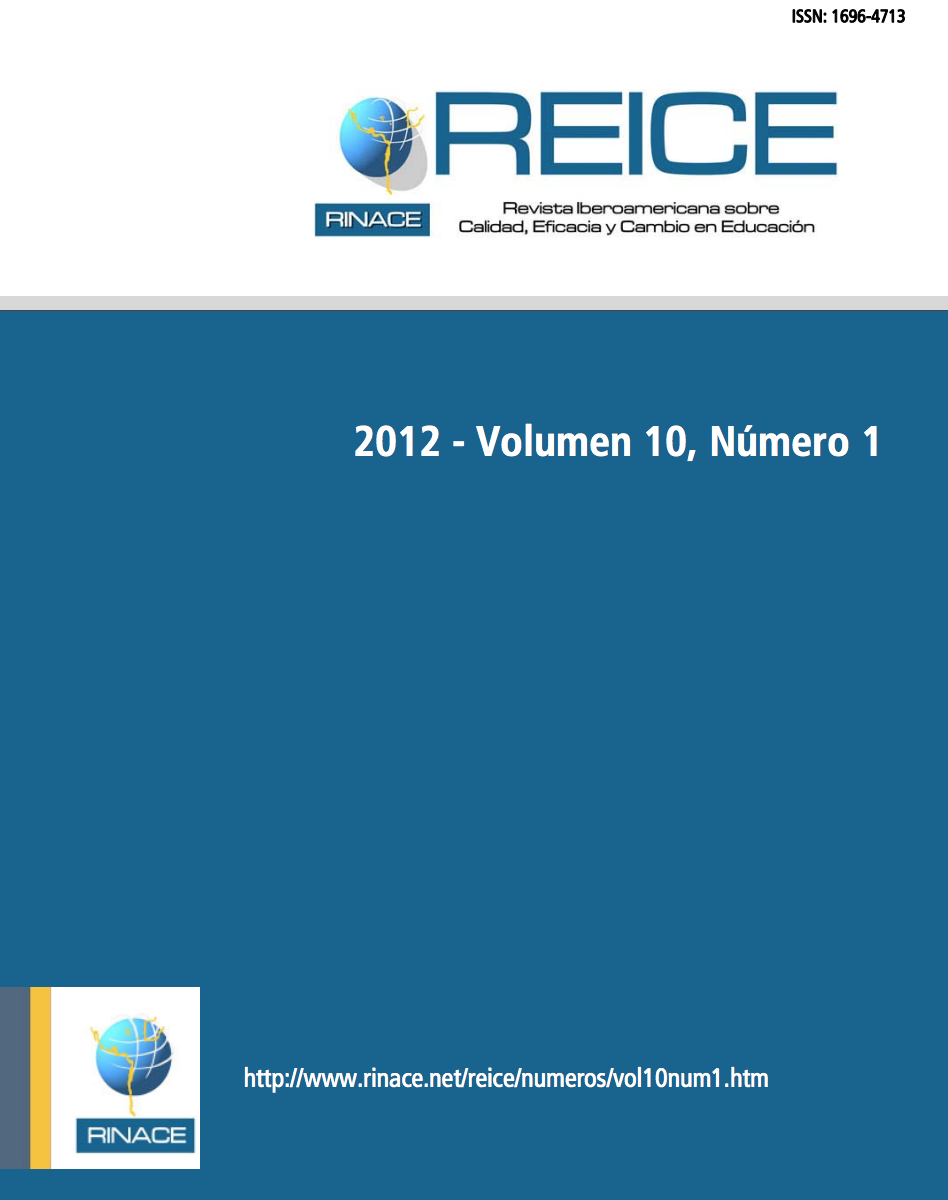Keywords:
Leadership, Life story, apprenticeship, International educational policiesCopyright (c) 2016 REICE. Revista Iberoamericana sobre Calidad, Eficacia y Cambio en Educación

This work is licensed under a Creative Commons Attribution-NonCommercial-NoDerivatives 4.0 International License.
Abstract
Evidence realize that the actions of leaders is an important variable that affects the improvement of the teaching and educational organizations. However, not much has been written about the acquisition, progression and refinement of knowledge and professional skills of principals. We developed a qualitative method, using the life story technique. Training paths were reconstructed in 4 stages: secondary education, initial training (higher education), pre-training exercise as principal, and continuing education in the role. Regarding the training instances are identified formal and informal. We identified the following learning ineducational trajectories: on communication skills and positive interpersonal relationships, role of teachers, teaching - learning, administration and management. Results reveal mainly informal instances, with observation models, and special emphasis on "observation and action. " In turn, are continuously practice debates, and experience in coordination and implementation of real projects. For paths of training, learning categories show an increasing complexity as progress the stages of formation. Regarding the instances and methods, this study relieves participation in groups, with diverse professional and / or work experience, holding various roles. In turn, identifying the learning on the job, with the development of work and group projects, and periodic evaluations and monitoring.
Downloads
References
Bericat, E. (1998). La integración de los métodos cuantitativos y cualitativos en la investigación social. Barcelona: Editorial Ariel.
Berson, Y., Nemanich, L. Walkman, D., Galvin, B. Y Keller, R. (2006). Leadership and organizational learning: A multiple levels perspective. The Leadership Quarterly, 17.
Bolívar, A. (2002). ¿De nobisipsis silemus?. Epistemología de la investigación biográfico-narrativa en educación. La investigación hermenéutico-narrativa versus la tradicional-positivista. Revista Electrónica de Investigación Educativa, 4 (1).
Bolívar, D. y Fernández, (2001). La investigación biográfico–narrativa en educación. Enfoque y metodología. Madrid: La Muralla.
Carbone, R. (2008). Situación del Liderazgo Educativo en Chile. Santiago de Chile: Universidad Alberto Hurtado, y Unidad de Gestión y Mejoramiento Educativo - Ministerio de Educación.
Carnoy, M. (2008). Presentación en Lanzamiento del Centro de Estudios de Políticas Prácticas en Educación, Universidad Católica de Chile, 16 de octubre 2008.
Comisión de las comunidades europeas (2001). Hacer realidad un espacio europeo del aprendizaje permanente. Comunicación de la comisión 21.11.2001, 678 Final, Bruselas.
Concha, C. (2007). Claves para la formación de directivos de instituciones escolares. Revista Electrónica Iberoamericana sobre Calidad, Eficacia y Cambio en Educación, 5 (5e), pp. 133-138.
Cox, C. (2003). Políticas educacionales en el cambio de siglo: la reforma del sistema escolar de Chile. Santiago de Chile: Editorial Universitaria.
Darling-Hammond, L., LaPointe, M., Meyerson, D., y Orr, M. (2007). Preparing school leaders for a changing world: Executive summary. Stanford: Stanford University, Stanford Educational Institute.
Elmore, R. (2010). Teorías de la acción. Mejorando la escuela desde la sala de clases. pp. 37-55. Santiago de Chile: Fundación Chile.
Galdames-Poblete, S. y Rodríguez-Espinoza, S. (2010). Líderes Educativos Previo a Cargos Directivos. Una Nueva Etapa de Formación. REICE. Revista Iberoamericana sobre Calidad, Eficacia y Cambio en Educación, 8 (4), pp. 50-64. Consultado en: http://www.rinace.net/reice/numeros/arts/vol8num4/art3.pdf.
Hargreaves, A. y Fink, D. (2006). El Liderazgo Sostenible. Siete Principios para el Liderazgo en Centros Educativos Innovadores. Madrid: CIDE / Ediciones Morata.
Hopkins, D. (2008). Hacia una buena escuela, experiencias y lecciones. Santiago de Chile: Fundación Chile y Fundación CAP.
Kelchtermans,G. (1994). Biographical methods in the study of teachers’ professional development. In I. Carlgren,G. Handal,and S. Vaage (Eds.), Teacher thinking and action invaried contexts. Research on teachers’ thinking and practice(pp. 93–108). London: Falmer Press.
Kelchtermans, G. (1994). Biographical Methods in the study of teachers’ professional development. Chapter 6, Teacher’s mind and action. Research on teacher’s thinking and practice. Carlgreen, Handal and Vaage. The Falmer Press.
Leithwwod, K., Jantzi, D. and Mascall, B. (2002). A framework for research on large-scale reform. Journal of Educational Change 3, pp. 7–33.
Muñoz, G., Marfan, J., Horn, A., y Weinstein, J. (2010). Formación y Entrenamiento de los Directores Escolares en Chile: Situación actual, desafíos y propuestas de política. Proyecto FONIDE N°: F420972.
OCDE (2008) Education and training policy. Improving school leadership, 1. Policy and practice. Paris: OCDE.
Parker, R. (2002). Passion and Intuition: The impact of life history on leadership. Practitioner Enquiry Report. Inglaterra: NCSL.
Pinto, V., Galdames, S. y Rodriguez, S. (2010). Aprendizajes y desafíos para la formación de líderes intermedios de organizaciones educativas. Psicoperspectivas, 9 (2), pp. 136-157.
Portela, A., Nieto, J. y Toro, M., (2009). Historias de vida: perspectiva y experiencia sobre exclusión e inclusión escolar. Profesorado, Revista Curriculum y formación del profesorado, 13 (3). Consultado en: http://www.ugr.es/local/recfpro/rev133ART8.pdf.
Tedesco, J.C. (2004) Igualdad de oportunidades y Política Educativa, en Políticas Educativas y Calidad Reflexiones del Seminario Internacional pp. 21-31. Santiago de Chile: Fundación Ford, Universidad Alberto Hurtado, UNICEF, UNESCO.
Volante, P. (2008). Influencia de la dirección escolar en los logros académicos. V congreso internacional sobre dirección de centros educativos. Bilbao: Universidad de Deusto.
Wallace Foundation (2008). Becoming a Leader: Preparing school principals for today’s school. New York: The Wallace Foundation.
West-Burnham, J. (2009.) Developing outstanding leaders. Professional Life Histories of Outstanding Headteachers. Full report. Inglaterra: NCSL.
